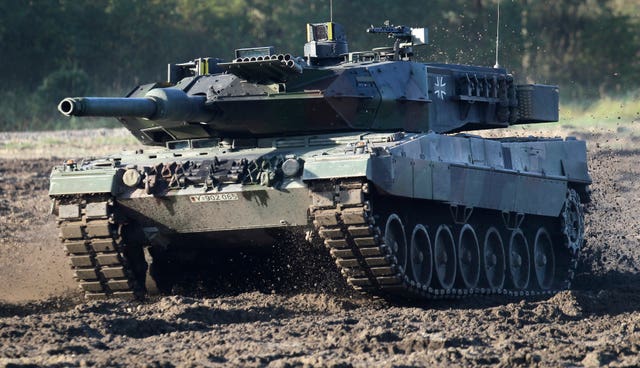Germany confirms plans to give Ukraine tanks to fight off Russian invaders
Chancellor Olaf Scholz said on Wednesday Germany is ‘acting in close co-ordination’ with its allies.

The German government has confirmed it will provide Ukraine with Leopard 2 battle tanks and approve requests by other countries to do the same.
Chancellor Olaf Scholz said on Wednesday Germany is “acting in close co-ordination” with its allies.
In a statement, the government said it will initially provide Ukraine with one company of Leopard 2 A6 tanks, which comprises 14 vehicles, from its own stocks.
The goal is to provide Ukraine with a total of two battalions – 88 tanks – together with other countries.

The long-awaited decision comes after US officials said a preliminary agreement had been struck for the United States to send M1 Abrams tanks to help Kyiv push back Russian forces entrenched in the east almost a year since the start of the war.
Mr Scholz had insisted that any move to provide Ukraine with powerful Leopard 2s would need to be closely co-ordinated with Germany’s allies, chiefly the United States.
By getting Washington to commit some of its own tanks, Berlin hopes to spread the risk of any backlash from Russia.
Ekkehard Brose, head of the German military’s Federal Academy for Security Policy, said tying the United States into the decision was crucial to avoid Europe facing a nuclear-armed Russia alone.
But he also noted the deeper historic significance of the decision.
“German-made tanks will face off against Russian tanks in Ukraine once more,” he said, adding that this was “not an easy thought” for Germany, which takes its responsibility for the horrors of the Second World War seriously.
“And yet it is the right decision,” Mr Brose said, arguing that it is up to Western democracies to help Ukraine stop Russia’s military campaign.
—
German defence minister Boris Pistorius said it will take about three months for the first tanks to be deployed in Ukraine. He described the Leopard 2 as “the best battle tank in the world”.
“This is an important game change, possibly also for this war, at least in the current phase,” he said.
—
Kremlin spokesman Dmitry Peskov described German and US intentions with the tanks as a “a rather disastrous plan”.
“I am convinced that many specialists understand the absurdity of this idea,” he told reporters on Wednesday.
“Simply because of technological aspects, this is a rather disastrous plan. The main thing is, this is a completely obvious overestimation of the potential (the supply of tanks) would add to the armed forces of Ukraine. It is yet another fallacy, a rather profound one,” the Kremlin official said.
Mr Peskov predicted “these tanks will burn down just like all the other ones… Except they cost a lot, and this will fall on the shoulders of European taxpayers,” he added.
Members of Mr Scholz’s three-party coalition government welcomed the news ahead of the official announcement.
“The Leopard’s freed!” said German politician Katrin Goering-Eckardt, a senior Green party member.
Marie-Agnes Strack-Zimmermann, a member of the Free Democratic Party who chairs the parliamentary defence committee, said the news is “a relief for a mistreated and brave Ukraine”.
“The decision to approve (other countries’ requests) and supply the Leopard 2 was arduous but unavoidable,” she said.
Ms Strack-Zimmermann was one of the loudest voices calling for a swift decision on arms supplies to Ukraine.
Two smaller opposition parties criticised the move, however.
The far-right Alternative for Germany called the decision “irresponsible and dangerous”.
“Germany risks being drawn directly into the war as a result,” its co-leader Tino Chrupalla said. The party, known by its acronym AfD, has friendly ties to Russia.
The Left party, which also has historic links to Moscow, warned of a possible escalation in the conflict.
“The supply of Leopard battle tanks, which ends a further taboo, potentially takes us closer to a third world war than in the direction of peace in Europe,” the party’s parliamentary leader, Dietmar Bartsch, told German news agency dpa.
Recent opinion polls showed German voters split on the idea.
The pressure on Mr Scholz mounted this week after Poland formally asked Germany to approve sending Leopard 2 tanks from Polish stocks to Ukraine.
Poland’s Prime Minister Mateusz Morawiecki accused Germany of “delaying, being evasive and acting in a way that is difficult to understand” when it came to supplying tanks, and went so far as to claim Berlin appeared not to want to help Ukraine.
“The decision to send Leopards to Ukraine is a big step towards stopping Russia,” Mr Morawiecki wrote on Twitter on Wednesday. “Together we are stronger.”
Other European nations have also indicated a willingness to part with their own battle tanks as part of a larger coalition.
Germany news weekly Der Spiegel said Berlin could initially approve the supply of one tank company, comprising 14 vehicles.
But Ukrainian President Volodymyr Zelensky made it clear late on Tuesday he hopes to receive a more substantial number of tanks from western allies.
“It is not about five or 10 or 15 tanks. The need is greater,” he said.
The German government said it plans to swiftly begin training Ukrainian tank crews in Germany.
The package being put together will also include logistics, ammunition and maintenance.
The UK had already announced plans to send 14 of its Challenger 2 tanks to Ukraine, and Prime Minister Rishi Sunak welcomed Germany’s decision to further “strengthen Ukraine’s defensive firepower”.
“Together, we are accelerating our efforts to ensure Ukraine wins this war and secures a lasting peace,” he said on Twitter.
Still, it is not clear whether Ukraine will receive the estimated 300 tanks that analysts say are required to keep Russia from advancing in Donetsk, Luhansk and Zaporizhzhia provinces and to press a counteroffensive in the country’s south-east.
Andriy Yermak, head of the Ukrainian president’s office, said on Telegram after Germany’s announcement that “many Leopards are needed”.





